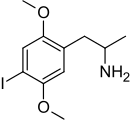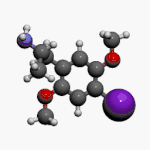2,5-Dimethoxy-4-iodoamphetamine
2,5-Dimethoxy-4-iodoamphetamine (DOI) is a psychedelic drug and a substituted amphetamine. Unlike many other substituted amphetamines, however, it is not primarily a stimulant.[2] DOI has a stereocenter and R-(−)-DOI is the more active stereoisomer. In neuroscience research, [125I]-R-(−)-DOI is used as a radioligand and indicator of the presence of 5-HT2A serotonin receptors. DOI's effects have been compared to LSD, although there are differences that experienced users can distinguish. Besides the longer duration, the trip tends to be more energetic than an LSD trip, with more body load and a different subjective visual experience. The after effects include residual stimulation and difficulty sleeping, which, depending on the dose, may persist for days.[2] While rare, it is sometimes sold as a substitute for LSD, or even sold falsely as LSD, which may be dangerous because DOI does not have the same established safety profile as LSD.[3]
 | |
 | |
| Names | |
|---|---|
| IUPAC name
1-(4-Iodo-2,5-dimethoxyphenyl)propan-2-amine | |
| Identifiers | |
| |
3D model (JSmol) |
|
| ChEMBL | |
| ChemSpider | |
PubChem CID |
|
| UNII | |
CompTox Dashboard (EPA) |
|
| |
| |
| Properties | |
| C11H16INO2 | |
| Molar mass | 321.1558 g/mol |
| Melting point | 201.5 °C (394.7 °F; 474.6 K) (hydrochloride) |
| 10 mg/mL[1] | |
Except where otherwise noted, data are given for materials in their standard state (at 25 °C [77 °F], 100 kPa). | |
| Infobox references | |
Research
Research[4] suggests that administration of (R)-DOI blocks pulmonary inflammation, mucus hyper-production, airway hyper-responsiveness and turns off key genes in in-lung immune response. These effects block the development of allergic asthma in a mouse model.
Several 5-HT2A agonist hallucinogens including (R)-2,5-Dimethoxy-4-iodoamphetamine DOI, TCB-2, LSD and LA-SS-Az have unexpectedly also been found to act as potent inhibitors of TNF, with DOI being the most active, showing TNF inhibition in the picomolar range, an order of magnitude more potent than its action as a hallucinogen.[5][6][7]
Pharmacology
| Receptor | Ki (racemic DOI)[8] | Ki (R-DOI)[8] | Ki (S-DOI)[8] | Intrinsic activity[9] |
|---|---|---|---|---|
| 5-HT1A | 2355 nM | 3843 nM | ND | ND |
| 5-HT1B | 1261 nM | ND | ND | ND |
| 5-HT1D | 1241.3 nM | ND | ND | ND |
| 5-HT1E | 2970 nM | ND | ND | ND |
| 5-HT1F | 2125.44 nM | ND | ND | ND |
| 5-HT2A | 0.68 nM | 0.65 nM | 0.65 nM | Partial agonist. |
| 5-HT2B | 20.03 nM | 53.70318 nM | 28.183829 nM | Partial agonist/full agonist |
| 5-HT2C | 2.38 nM | 5.370318 nM | 8.317638 nM | Full agonist when coupled to phospholipase A. Partial agonist (intrinsic efficacy = 53%), when coupled to phospholipase C. |
| 5-HT5A | 1000 nM | ND | ND | ND |
| 5-HT5A | 1000 nM | ND | ND | ND |
| 5-HT6 | >10000 nM | ND | ND | ND |
DOI is a 5-HT2A, 5-HT2B and 5-HT2C receptor agonist.[9]
DOI has been shown to be an extremely potent inhibitor of tumour necrosis factor-alpha inflammation at picomolar concentrations in cell studies. TNF-alpha is an important target for research into degenerative conditions such as rheumatoid arthritis and Alzheimer's disease, where the disease process involves tissue damage through chronic inflammation. This could make DOI and other 5-HT2A agonists an entirely new area for development of novel treatments for these conditions.[10]
DOI has also been shown to induce rapid growth and reorganization of dendritic spines and synaptic connections with other neurons, processes known to underlie neuroplasticity.[11]
History
DOI was first synthesized by Alexander Shulgin.[2] The radioactive iodine-125 form of DOI for PET imaging was first developed in the lab of David E. Nichols.
In January 2007, British police reported that three young men had fallen ill, reportedly, after taking DOI at a rave in Biggleswade, near Milton Keynes, and warned others who had taken it to seek medical attention. This would appear to be the first indication that DOI has found more widespread use as a recreational drug in the UK.[12]
Legal status
Australia
The Standard for the Uniform Scheduling of Medicines and Poisons (SUSMP) of Australia does not list DOI as a prohibited substance.[13]
Canada
Listed as a Schedule 1[14] as it is an analogue of amphetamine.[15] The CDSA was updated as a result of the Safe Streets Act changing amphetamines from Schedule 3 to Schedule 1.[16]
Denmark
Illegal since 8 April 2007.[17]
Sweden
Sveriges riksdag added DOI to schedule I ("substances, plant materials and fungi which normally do not have medical use") as narcotics in Sweden as of August 30, 2007, published by Medical Products Agency in their regulation LVFS 2007:10 listed as DOI, 4-jod-2,5-dimetoxi-amfetamin.[18]
United States
DOI is not scheduled in the United States,[19] but it is likely that DOI would be considered an analog (of DOB), in which case, sales or possession could be prosecuted under the Federal Analogue Act. DOI is occasionally used in animal and in vitro research. Scheduling DOI could cause problems for medical researchers.
US State of Florida
DOI is a Schedule I controlled substance in the state of Florida.[20]
References
- "D101 DOI hydrochloride ≥98% (HPLC), solid". Retrieved 13 April 2008.
- Shulgin, A; Shulgin, A (1990). "#67 DOI". PiHKAL: A Chemical Love Story. Transform Press. ISBN 978-0963009609. Archived from the original on 2009.
- DEA (June 2008). "DEA Mircrogram". Microgram Bulletin. DEA, United States Government. Archived from the original on 2009-02-04. Retrieved 12 February 2009.
- "LSU Health New Orleans research finds psychedelic drug prevents asthma development in mice". EurekAlert!.
- Miller KJ, Gonzalez HA (December 1998). "Serotonin 5-HT2A receptor activation inhibits cytokine-stimulated inducible nitric oxide synthase in C6 glioma cells". Ann. N. Y. Acad. Sci. 861 (1): 169–73. Bibcode:1998NYASA.861..169M. doi:10.1111/j.1749-6632.1998.tb10188.x. PMID 9928254.
- Yu B, Becnel J, Zerfaoui M, Rohatgi R, Boulares AH, Nichols CD (November 2008). "Serotonin 5-hydroxytryptamine(2A) receptor activation suppresses tumor necrosis factor-alpha-induced inflammation with extraordinary potency". J. Pharmacol. Exp. Ther. 327 (2): 316–23. doi:10.1124/jpet.108.143461. PMID 18708586.
- Pelletier M, Siegel RM (December 2009). "Wishing away inflammation? New links between serotonin and TNF signaling". Mol. Interv. 9 (6): 299–301. doi:10.1124/mi.9.6.5. PMC 2861806. PMID 20048135.
- Roth, BL; Driscol, J (12 January 2011). "PDSP Ki Database". Psychoactive Drug Screening Program (PDSP). University of North Carolina at Chapel Hill and the United States National Institute of Mental Health. Archived from the original on 8 November 2013. Retrieved 4 March 2014.
- Canal, CE; Morgan, D (July 2012). "Head-twitch response in rodents induced by the hallucinogen 2,5-dimethoxy-4-iodoamphetamine: a comprehensive history, a re-evaluation of mechanisms, and its utility as a model". Drug Testing and Analysis. 4 (7–8): 556–576. doi:10.1002/dta.1333. PMC 3722587. PMID 22517680.
- Yu, B; Becnel, J; Zerfaoui, M; Rohatgi, R; Boulares, AH; Nichols, CD (2008). "Serotonin 5-Hydroxytryptamine2A Receptor Activation Suppresses Tumor Necrosis Factor-α-Induced Inflammation with Extraordinary Potency". Journal of Pharmacology and Experimental Therapeutics. 327 (2): 316–323. doi:10.1124/jpet.108.143461. PMID 18708586.
- Jones, KA; Srivastava, DP; Allen, JA; Strachan, RT; Roth, BL; Penzes, P (17 November 2009). "Rapid modulation of spine morphology by the 5-HT2A serotonin receptor through kalirin-7 signaling". Proceedings of the National Academy of Sciences. 106 (46): 19575–19580. Bibcode:2009PNAS..10619575J. doi:10.1073/pnas.0905884106. PMC 2780750. PMID 19889983.
- "New drug alert as three taken ill". BBC News. 29 January 2007.
- Gill, A (22 July 2013). "POISONS STANDARD 2013" (PDF). Therapeutic Goods Administration. Australian Government Department of Health and Ageing. Retrieved 4 March 2014.
- (in English)
- (in English)
- (in English)
- (in English)
- http://www.lakemedelsverket.se/upload/lvfs/LVFS_2007-10.pdf
- "PART 1308 - Section 1308.11 Schedule I". www.deadiversion.usdoj.gov.
- "Statutes & Constitution :View Statutes : Online Sunshine". leg.state.fl.us.